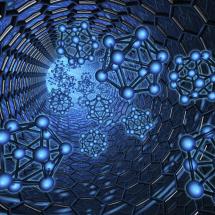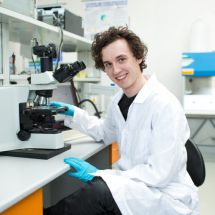
|
Chemistry, Technology and Materials
The study programme “Chemistry, Technology, and Materials” consists of two specializations, “Chemistry and Chemical Technology” and “Materials Chemistry and Technology”. This programme is designed as a follow-up Master programme (culminating with a Master degree and the Czech title Ing., the equivalent of an MSc.). The programmes builds upon prior education of graduates with bachelor degrees (Bc.) from the UCT Prague “Chemistry and Technology” bachelor programme or an equivalent bachelor programme at a university or comparable institution abroad. The programme is taught in English (requiring, at a minimum, B2 level English language skills) and is designed for students that cannot or do not wish to enrol in a Czech language programme.
Careers
Students from the programme graduate with one of two specializations, “Chemistry and Chemical Technology” or “Materials Chemistry and Technology”, and are well qualified for positions in the chemical industry and all materials-oriented sectors. The Czech title Ing. (equivalent to an MSc.) is the most acknowledged title for highly-qualified professionals in production plants, especially technologists and production managers, as well as for applied research and development (R&D) and supervisory quality control (QC) positions. Due to the solid and sufficiently general foundation in chemistry, technology, and materials, graduates of this programme are well prepared for choosing careers that are close to, but not necessarily identical with, their specializations. Of course, an added bonus of this English programme is the fact that graduates are well prepared to enter highly competitive and dynamic European and worldwide job markets. It goes without saying that graduates of this English programme are also optimally prepared for Ph.D. studies and subsequent academic careers in Chemistry, Materials Science, and related fields anywhere in Europe or in other English-speaking countries.
Specialisation - Chemistry and Chemical Technology
In addition to this common programme foundation, with a Chemistry and Chemical Technology specialization, students focus on organic synthesis, retrosynthesis, process design, molecular spectroscopy, and several more specialized topics (catalysis, transition metals in organic synthesis, and so on). Students can also select a Master Double Degree in Applied Chemistry according to a bilateral agreement between the UCT Prague, Czech Republic, and the University of Burgundy in Dijon, France. This double degree requires one year abroad and one year at the home university.
→ more
In addition to this common programme foundation, with a Chemistry and Chemical Technology specialization, students focus on organic synthesis, retrosynthesis, process design, molecular spectroscopy, and several more specialized topics (catalysis, transition metals in organic synthesis, and so on). Students can also select a Master Double Degree in Applied Chemistry according to a bilateral agreement between the UCT Prague, Czech Republic, and the University of Burgundy in Dijon, France.
This double degree requires one year abroad and one year at the home university.
Careers
Typical careers in this specialization will be in the organic chemistry and catalysis sectors. Graduates of this specialization can expect to be in high demand for technological and management positions and have competitive basic and applied research skills applicable to both commercial and academic sectors.
← less
Specialisation - Materials Chemistry and Technology
With the “Materials Chemistry and Technology” specialization, students graduate with a thorough foundation in chemistry and physics of solids, microstructure-property relations, crystal chemistry, spectroscopic and microscopic characterization of materials, and mechanics of materials, and can simultaneously focus more specifically on a material class of their choice (metals, polymers, glass, or ceramics).
→ more
With the “Materials Chemistry and Technology” specialization, students graduate with a thorough foundation in chemistry and physics of solids, microstructure-property relations, crystal chemistry, spectroscopic and microscopic characterization of materials, and mechanics of materials, and can simultaneously focus more specifically on a material class of their choice (metals, polymers, glass, or ceramics).
Careers
Typical careers for graduates of this specialization will be in the metal, polymer, glass, and ceramic, and related inorganic materials- and processing-oriented industries. Graduates can expect to be in high demand for technological and management positions and have competitive basic and applied research skills applicable to both commercial and academic sectors.
← less
Programme Details
| Study Language
|
English |
|
Duration
|
2 years |
| Form of study
|
full-time
|
| Place of study
|
Praha |
| Capacity
|
10 students |
| Programme code (national)
|
N0711A130004 |
| Programme Code (internal)
|
N107
|
|
 study.vscht.cz
study.vscht.cz



